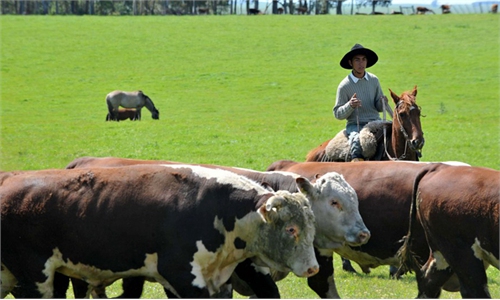China-LatAm cooperation continues momentum despite changes in regional countries' politics

Illustration: Tang Tengfei/GT
This year is a year of elections in Latin America. Gabriel Boric, the candidate for the left-wing political party in Chile, was recently elected as president by an absolute majority. His election has aroused widespread concern in the international community, not only because he will be Chile's youngest modern president when he takes office, but also because he declared "the end of the neoliberal era," which signals a left-ward trend in Chile.
The return of leftists in Chile has strengthened the political trend of Latin America in the past two years and showed the tendency of left-wing parties to occupy half of the region as they did during the early years of this century. Left-wing parties in Mexico, Argentina, Bolivia, Peru, and Honduras have been in power in the last two years. Together with Cuba, Nicaragua, Venezuela, and Brazil - Luiz Inácio Lula da Silva is expected to win the election next year - a new round of "Pink Tide" in Latin America seems to be formed.
Political swinging in Latin American countries is the result of a long-term struggle between left and right political forces. The political "pendulum phenomenon" has a long historical background in Latin American countries and has evolved into a normalized phenomenon. Having occurred since WWII, it has gradually become a political tradition along with the development of the domestic and international situation.
Voters in Latin American countries vote for a party based on the policies they implement during the ruling period. Take Chile. Since the administration of Augusto Pinochet Ugarte implemented "neoliberal" reforms in the 1970s, although Chile achieved short-term prosperity, economic development did not significantly improve people's living standards, nor provided them with a sense of happiness or satisfaction. On the contrary, it increased inequality of income distribution. According to the United Nations, Chile is one of the countries with the largest income distribution gap in the world.
The legacy of the Pinochet period is being despised by Chilean voters now and the pandemic has made the situations of middle- and lower-class people deteriorate. Therefore, Chilean voters increasingly yearn for change, as riots and street movements that broke out in 2019 have shown. Under such circumstances, it is not surprising that the candidates from right-wing parties who still adhered to the doctrine of "neoliberalism" were abandoned by voters.
Boric, with a political career starting from student movements, pointed his finger at "neoliberalism," criticizing the reform for worsening social problems. He emphasized state regulation, promising to improve the tax and medical systems and abolish the pension system. These propositions favor the poor and cater to the desire of the middle- and lower-classes to change the current situation. Their strong enthusiasm for political participation aroused them to vote for Boric, who represents their interests. This is the reason why left-wing parties represented by Boric finally defeated the right-wing camp.
In the past few years, whenever right-wing tendencies in Latin America rebounded, some worried that China-Latin America relations would suffer "a heavy blow." When left-wing returned, Western media speculated on fires in the "backyard" of the US or claimed that China was taking the opportunity to increase its influence in Latin America. Indeed, ideology is important in the relations between the US and Latin America and between Latin America and China. However, it is not a decisive factor.
In fact, most Latin American countries, whether they are governed by left- or right-wing parties, follow a pragmatic principle and attach great importance to cooperation with China. It is rare for ideological factors to seriously affect China-Latin America cooperation.
In the first 20 years of this century, Latin American countries have repeatedly fluctuated between left-wing and right-wing parties. However, the 20 years have been an important period for the great development of China-Latin America relations. Both left-wing and right-wing parties tended to deepen ties with China in various fields. Since China is the second-largest economy in the world and is still undergoing rapid development, Latin American countries have greatly enjoyed the dividends brought by China's rapid economic growth. At present, China is the second largest trade partner of Latin America and the largest trading partner of many major Latin American countries. In addition, it is also one of the most important sources of investment for Latin American countries. For either the left-wing or right-wing governments in Latin America, if they want to consolidate their ruling foundations, they need to do a good job in terms of economy, and if they want to rejuvenate the economy, it is impossible for them to ignore China.
Second, there are mutual needs and similar interests between China and Latin America in other fields such as politics, which is also an objective factor and will not be changed whether the left or right wing comes to power.
In general, the continuous deepening of China-Latin America cooperation is a long-term trend. The common identity as a developing economy and the common aspiration for domestic development and international fairness have brought inexhaustible momentum for both sides, and this momentum will continue long into the future.
The author is a professor of Nankai University and vice-president of Latin American History Association of China. opinion@globaltimes.com.cn



